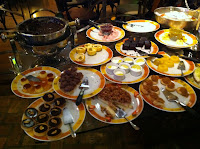 |
| Occupy Wall Street: Day 14 - by Long Island Rose |
At work I'm part of a team of about a dozen people. We're a true team. Sometimes a team is just a group of people who sit near each other and have the same manager. My team isn't like that. We share a purpose and core values. And we look out for each other.
Because we're a real team, we want each other to succeed—up, down, and sideways. All of us want to see our manager get promoted, and we tackle our projects knowing that our results reflect on him. For his part, he gives us more responsibility each time we prove ourselves; he rewards us with bonuses; and he spreads the word about our accomplishments and capabilities.
Those of us who are managers do the same for our employees. We build their skills through trainings and increasingly complex activities. We assign projects to match their interests. And we give them credit for the work they do, making sure other teams know what they're capable of.
It works sideways as well. We work together to complete projects for the good of the team and our business partners. We warn each other if a business partner is unhappy with someone's work. And we tell each other—and our business partners—when someone on the team has done a great job.
All of this leaves me wondering—what happened to team USA?
My manager gets paid a lot more than I do, but I want him to succeed anyway. It's not a zero-sum game. Why can't Occupy Wall Street or the Democrats or whomever be in favor of the top 1% being successful at their business endeavors?
The temporary employee who works for me gets paid much less than I do, but I want her to be successful anyway. It's not a zero-sum game. Why can't the Tea Party or the Republicans or whomever be in favor of those on the bottom rungs being successful at finding work and supporting their families?
Maybe it comes down to vision. My manager, his VP, and our CEO have set a vision of growing a company, helping our customers succeed, and doing the right thing for employees. Building a team of 12 takes work, creating a team from a company of 70,000 takes a lot of work, so turning a country of 300 million into a team is...hard. Really hard. But not impossible.
Team USA can solve the unemployment catastrophe and the debt crisis. We need leaders with vision. Leaders who focus on our country's common purpose and core values, not petty differences. I'd like to see our President and leaders of Congress come together as a team that wants each other to succeed. For the good of the Nation. Only through vision, trust, and common purpose—starting at the top—will we see a true Team USA.



